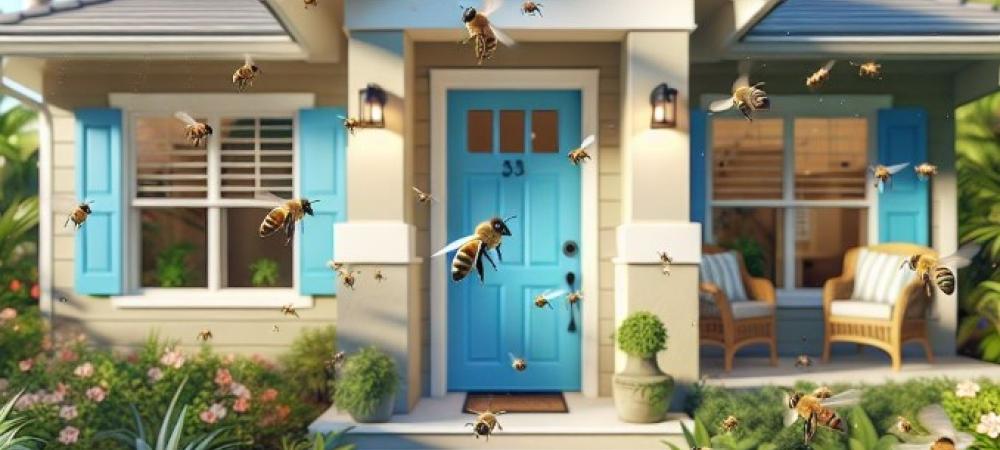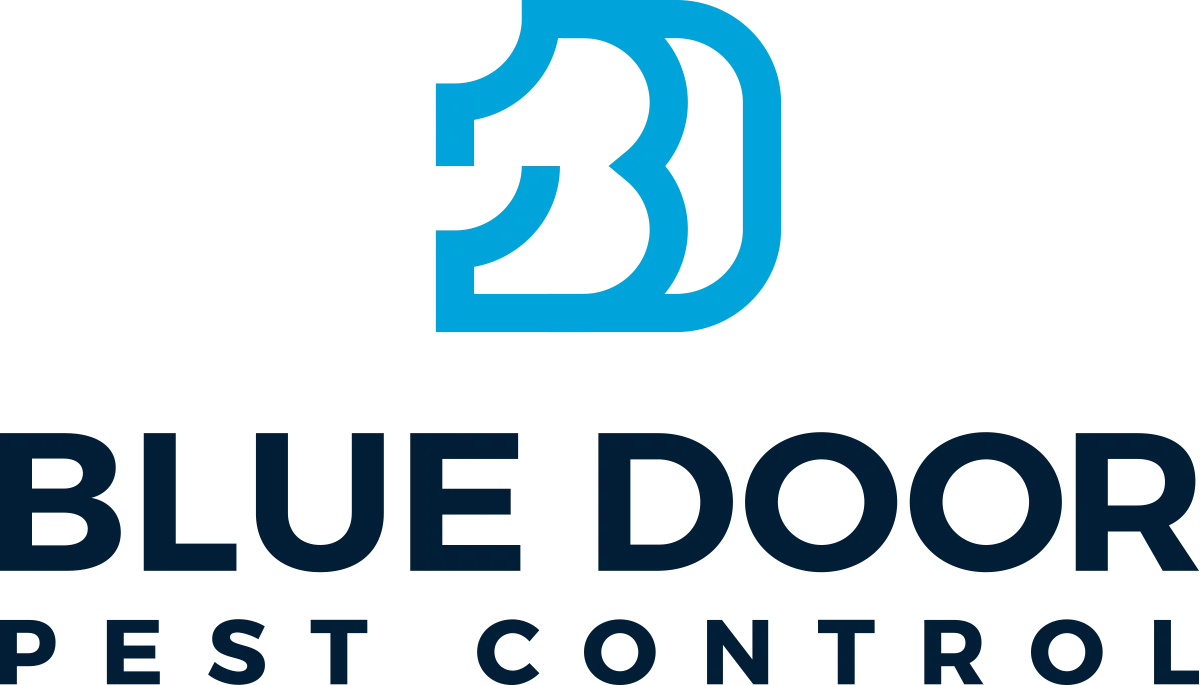Bee, Wasp & Hornet Control Jupiter, FL | Blue Door

In Jupiter, Florida, the warm, humid climate creates the perfect environment for various stinging pests like bees, wasps, hornets, and yellowjackets. While these pests can pose a risk to your family and home, they also play a vital role in the ecosystem. Knowing how to identify them, prevent infestations, and handle removal is key to keeping your property safe while maintaining balance in the environment.
This guide will walk you through the common types of stinging pests in Jupiter, how to prevent them, and when to call professional pest control services like Blue Door Pest Control.
Common Stinging Pests in Jupiter, Florida
Florida’s diverse wildlife includes many stinging pests that can become problematic when they nest too close to human activity. Here are the most common types you might encounter around your home in Jupiter.
1. Bees
- Description: The most common bees in Florida are honeybees and bumblebees. Honeybees are smaller and social, living in large colonies, while bumblebees are larger and usually more solitary.
- Behavior: Bees are typically non-aggressive unless provoked or if their nest is disturbed. Despite their potential to sting, bees are essential pollinators for local plants and crops.
- Role in the Ecosystem: Pollination is bees' primary ecological function. Without them, Jupiter’s agriculture and biodiversity would suffer.
2. Wasps
- Description: Paper wasps, yellowjackets, and hornets are common wasp species in Jupiter. Wasps have slender bodies and can sting multiple times.
- Behavior: Wasps are more aggressive than bees, especially when defending their nests. They commonly build nests under eaves, in attics, or in trees.
- Role in the Ecosystem: Wasps act as natural predators, helping to control pest populations in gardens by feeding on insects like caterpillars and flies.
3. Hornets
- Description: Hornets are larger, more aggressive cousins of wasps. They can sting multiple times and are extremely protective of their nests.
- Behavior: Hornets build large nests in trees, bushes, or under roof eaves. They tend to be highly defensive, and their sting can be particularly painful.
- Role in the Ecosystem: Like wasps, hornets help control insect populations by hunting and feeding on pests.
4. Yellowjackets
- Description: A type of wasp, yellowjackets are recognized by their distinctive black and yellow markings. They tend to become more aggressive in late summer and fall.
- Behavior: Yellowjackets are scavengers, often attracted to food and garbage. They are known for their aggressive behavior and can sting multiple times when defending their nests.
- Role in the Ecosystem: Yellowjackets also help control pest populations but can become a nuisance due to their attraction to human food sources.
Preventing Stinging Pests in Jupiter, FL
Prevention is the best defense when it comes to stinging pests. Implementing the following strategies can help reduce the likelihood of bees, wasps, or hornets nesting near your home.
1. Seal Entry Points
- Action: Inspect your home for small cracks, gaps, or other openings where pests can enter. Seal these areas using caulk or weather stripping.
- Best For: Preventing pests from nesting inside attics, wall cavities, or under roof eaves.
2. Remove Food Sources
- Action: Keep outdoor food and drink covered during barbecues or picnics. Secure garbage cans with tight lids and clean up spills promptly.
- Best For: Reducing the likelihood of attracting yellowjackets and other wasps.
3. Eliminate Standing Water
- Action: Regularly remove standing water from gutters, birdbaths, and other areas around your home. Stinging pests are drawn to water sources, especially during hot Florida days.
- Best For: Making your property less inviting to pests like wasps and bees.
4. Regular Inspections
- Action: Perform regular checks around your home and yard for signs of nests or increased pest activity. Early detection can help prevent infestations from growing.
- Best For: Stopping problems before they escalate. Professional inspections by Blue Door Pest Control can catch early signs that homeowners might miss.
Control Methods for Stinging Pests
If prevention fails and stinging pests start to take over, you’ll need effective pest control methods to remove them safely.
1. Physical Nest Removal
- Action: If the nest is small and accessible, you can attempt removal using protective clothing and a long-handled tool. However, for larger nests or nests in difficult locations, it’s best to hire professionals.
- Best For: Small, visible nests that are not in dangerous or hard-to-reach locations.
- Note: Blue Door Pest Control offers safe and professional nest removal services throughout Jupiter, FL, ensuring your home remains pest-free.
2. Chemical Treatments
- Action: Apply insecticide sprays directly to the nest, especially during the evening when the pests are less active. Follow all product safety instructions.
- Best For: Large infestations or nests in hard-to-reach areas where manual removal is unsafe.
3. Traps
- Action: Use commercial traps to reduce the number of flying stinging pests around your home. These traps lure pests inside with bait, preventing them from escaping.
- Best For: Controlling populations of yellowjackets and wasps in outdoor spaces like patios or gardens.
4. Professional Pest Control
- Action: Hiring a professional service like Blue Door Pest Control guarantees safe and effective removal of stinging pests. Professionals are equipped to handle even the most dangerous or difficult infestations, ensuring the safety of your family and pets.
- Best For: Large, aggressive infestations or when the nest is in a high-risk area.
Frequently Asked Questions About Stinging Pests in Jupiter, FL
Q: How can I tell if a wasp or hornet nest is active?
A: Watch for frequent insect activity around the nest. Active nests will have wasps or hornets flying in and out constantly.
Q: Is it safe to remove a stinging pest nest myself?
A: Small nests may be manageable with the right protective gear, but large or hidden nests should always be handled by professionals to avoid injury.
Q: What’s the best time to take preventive measures?
A: Spring is the best time to inspect for nests, as it’s when stinging pests begin building new ones. Early removal can prevent a summer infestation.
Q: What if I’m allergic to bee or wasp stings?
A: If you’re allergic, avoid any DIY pest control. Contact a professional like Blue Door Pest Control immediately for safe removal.
Conclusion: Call Blue Door Pest Control for Stinging Pest Solutions
Managing stinging pests in Jupiter, FL requires a combination of proactive prevention and expert control. Whether you're dealing with a minor bee problem or a dangerous wasp infestation, Blue Door Pest Control offers customized solutions to keep your home safe and pest-free. Contact us today for a free inspection!
